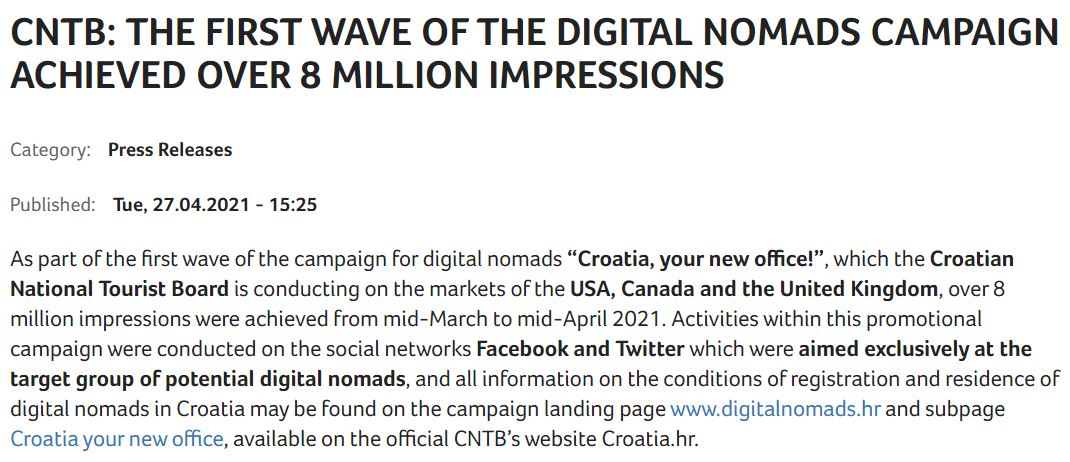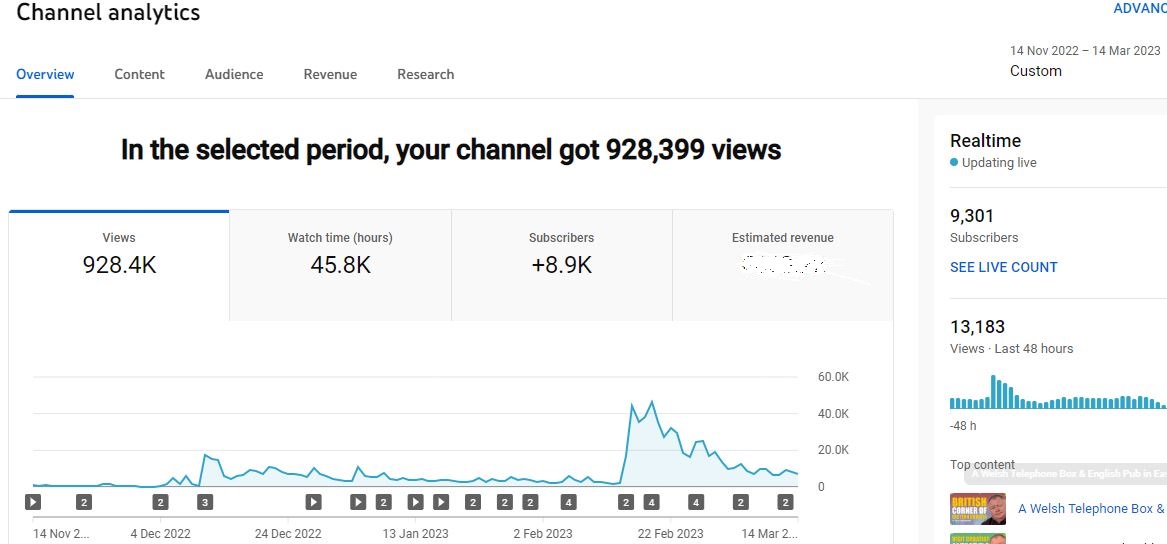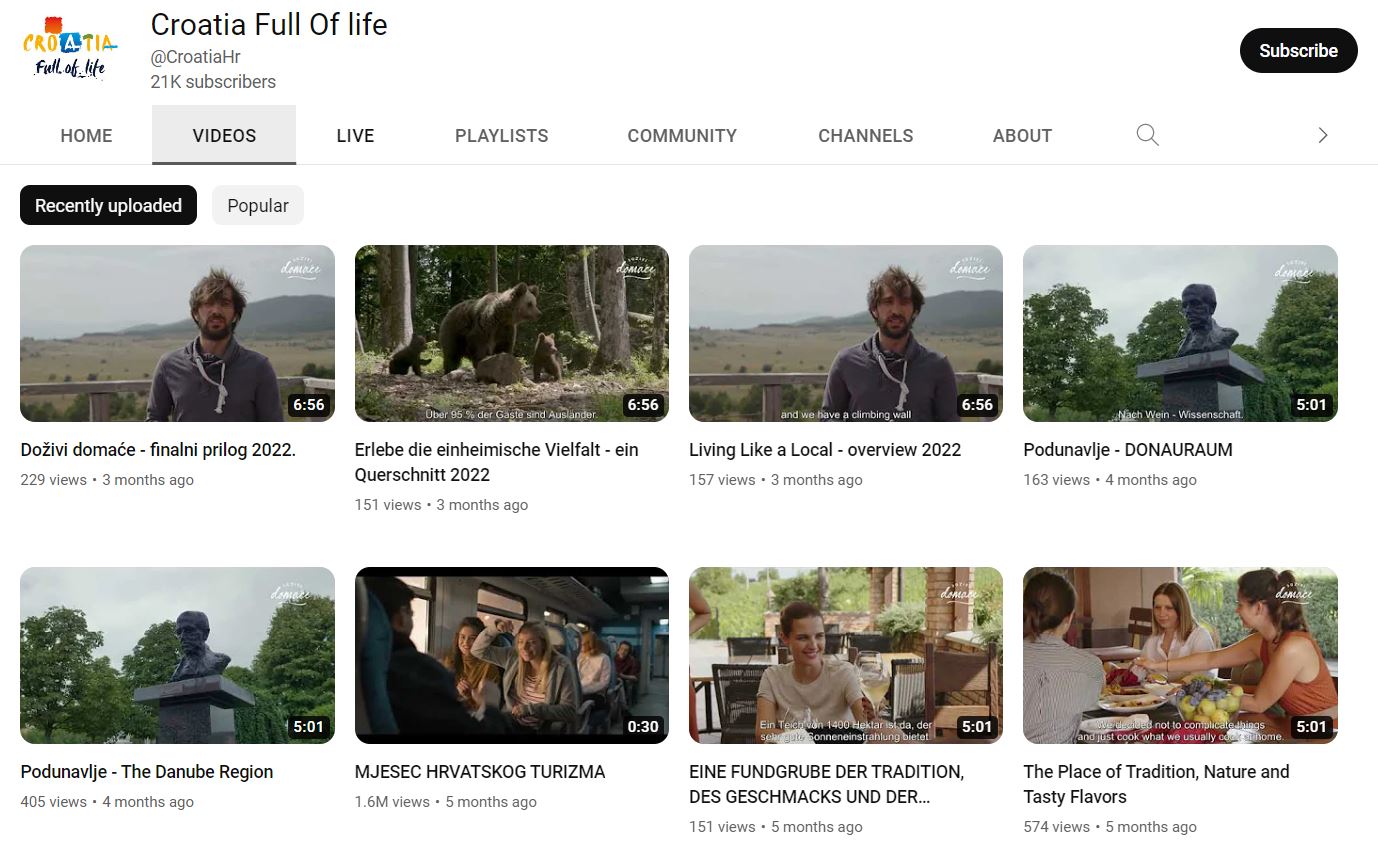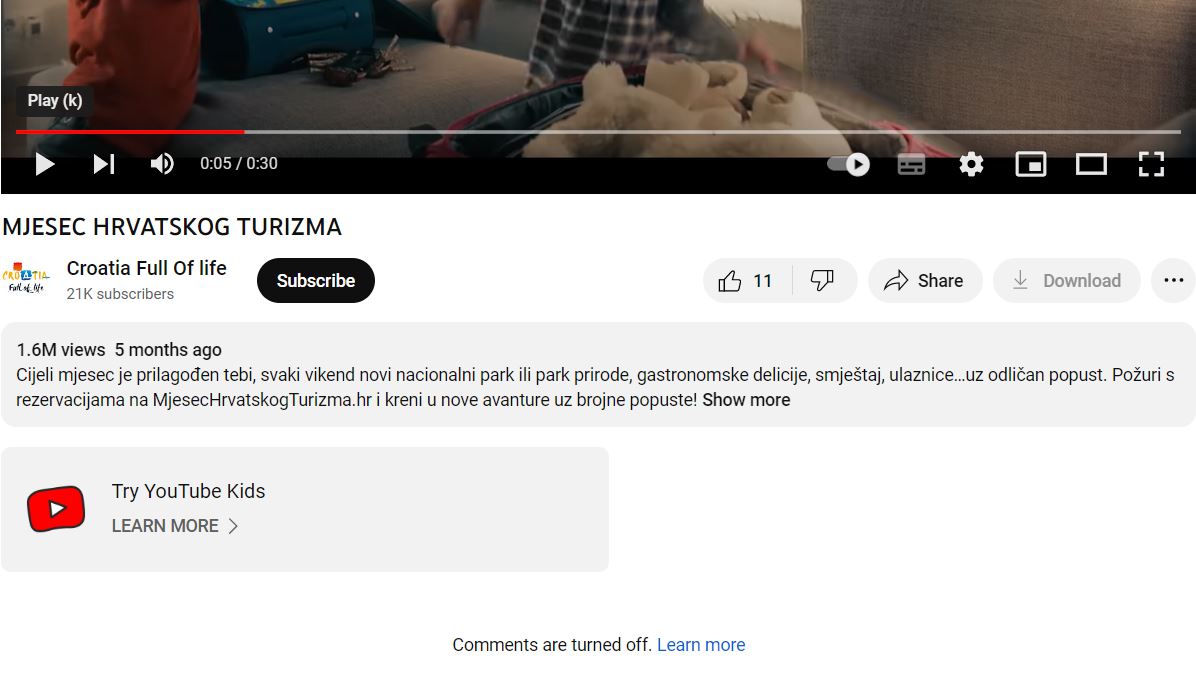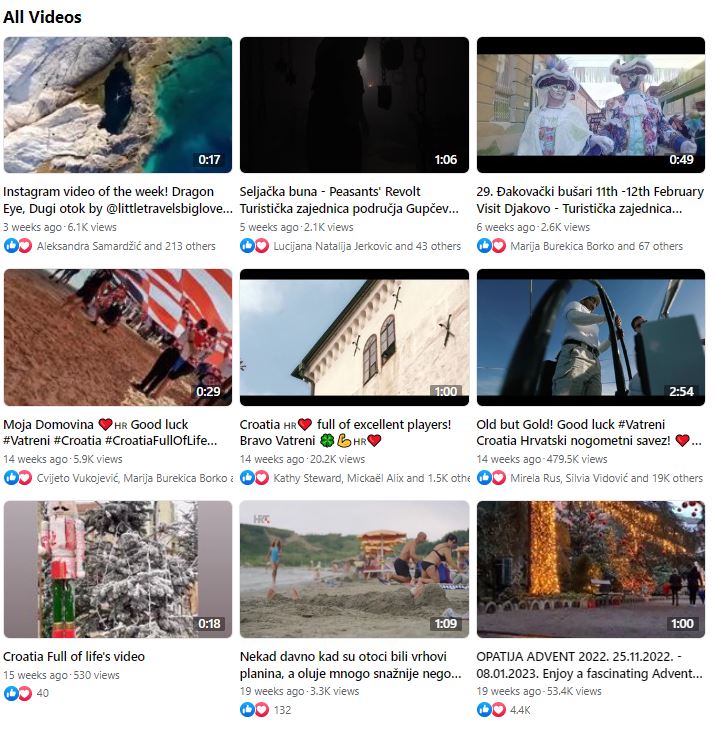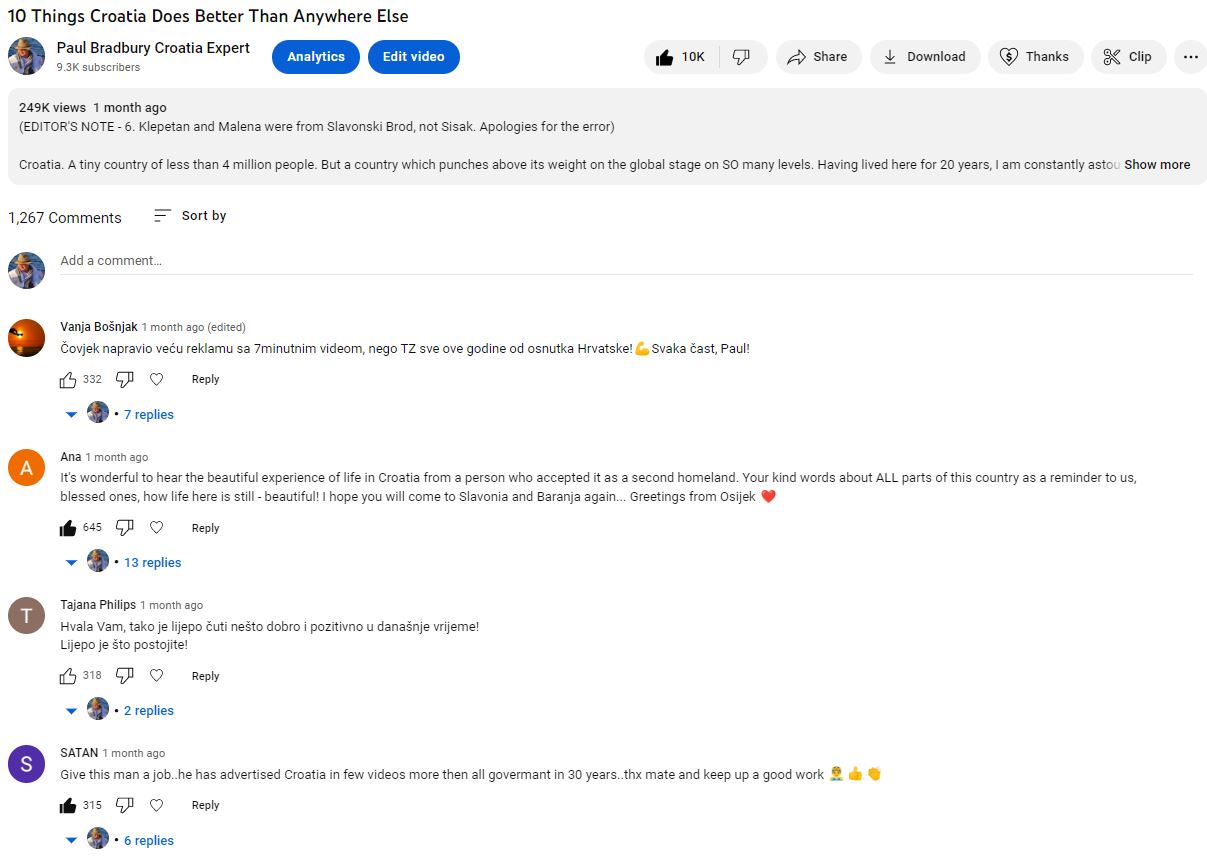Croatian Returnee Reflections: Dejan Cuk, from Salt Lake City to Split
March 22, 2023 - Whisper it quietly, but more and more people are relocating to Croatia from the diaspora. In a new TCN series, we meet them to find out how they are faring and what advice they have for others thinking of making the switch. Next up is Dejan Cuk, who moved from Salt Lake City to Split.
I was born in Gospic, Croatia, in 1991. A great time to be born in ex-Yugoslavia (sarcasm). It was around the heat of the war, and at that time, my family, like many people during that time, were either living with family or moving from place to place in order to survive. At one point, my family also immigrated to Serbia to live with family from my father’s side.
In 1998, my parents decided to move my older brother and me to the states for a chance at a better life. A decision that, when I look back at times, is one that really helped save all of us, as it allowed my brother and me a chance for a better life than the one we would have had we stayed; we lost everything.
I’m a graduate of the University of Utah with two bachelors (Sociology & Business Administration), and I’ve been working in Digital Marketing for 10+ years.

You made the switch to Croatia. Tell us a little about the decision process and how long it took for you to get on the plane?
Flying from Salt Lake City, Utah, to Croatia was expensive for my family, especially during the peak summer months, when we would typically go, so we went every 5-6 years. In 2014, my brother and I went just by ourselves, and that was when we decided we wanted to be back in Croatia for good. One thing is having an idea; it’s a whole different thing planning it.
I was still in college at that time, so my plan was finish that first. Then I told myself I needed a remote friendly job and before coronavirus there were really like 2 choices at the time; digital marketing or to be a programmer, I went with the former because it was more aligned with my studies. Being the planner that I am, that wasn’t enough. I also had to save up some money for those “what if scenarios” so I did that as well. Once I ticked off the boxes, one by one then I made the decision in 2019 to move back for good.
What did your family and community back home think of your decision at the time?
My parents knew about this, and supported the idea. Truth be told, growing up they would keep me and my brother tied to the culture as best they could and that honestly helped me realized how much I did want to go back.
As far as my friends, some were surprised and some were I’m sure envious/happy because there is a large part of our community regardless of where they are from the Balkans, that want to go back but again back to that question and answer from earlier, don’t know how to make it happen.
Where did you get your information about the realities of Croatia prior to coming?
I kept in touch with some family members in Croatia. Also, my parents were like the anchor and co-anchor for me and my brother, giving us news on what happened that day in Croatia. I found it silly and useless when I was younger but as I grew older I realized how important it was and how it helped me stay informed, even when I wasn’t living there.

What were you most nervous about making the switch? What was your biggest fear, and how was the reality of what you found?
I think I was a bit shy speaking the language around locals because of my “American” accent, but also because I wasn’t sure how some would react given that my vocabulary was a mix of ex-Yugoslavian i.e., not Croatian specific words.
I quickly got over that because my personality is more “who cares” than anything else but it was in the back of my mind.
My other fear I guess would be the administrative stuff, yes, I know the language but I don’t know the law and how things “worked-worked” if that makes sense. One thing is to live here and be on vacation when all you need to do is order drink and food, but it’s a whole other thing figuring out how to get your health insurance. In the end, I can say it all came out good, because I made an effort to understand it and ask questions. I wasn’t shy to ask questions about whatever I needed to get done.
Think back to the time before you arrived. What were your perceptions about Croatia and how were they different from the reality you encountered?
Being born in Croatia, and parents born there as well, I never had that culture shock that perhaps others might get. I knew what to expect, for the most part. Sure, there were small things like “Oh I have to put my own groceries in the bags” but I realized that as cashier kept ringing items up and they weren’t being put into a bag. #spoiled
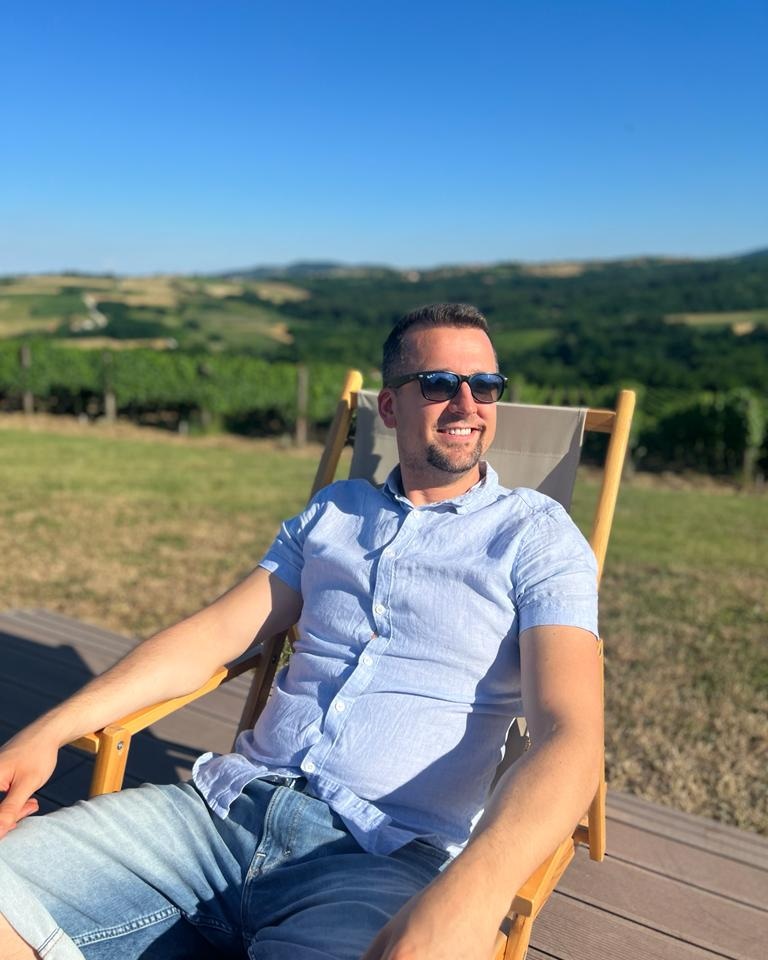
You are still here, so obviously the pros outweigh the cons. Tell us about some of the things that you love about being in Croatia, as well as some of the things you don't like.
I like the slower pace of life in Split, the 2-3 hours of drinking coffee and just chilling and talking about what’s new in one’s life is so refreshing because in the states you don’t have that. If you do go out, its with friends on a Friday/Saturday to get drinks and repeat again, where as in Croatia you can see people throughout the week and I really like that.
While on the topic of friends, I value that people here REALLY do become friends and its not just surface deep as it is in the states. People actually help each other through the darkest times and remain friends for 10+ years, which again is a rarity in the states. I changed so many friends from high school to college, and from college to the work force. It must be nice knowing that you are friends with someone that saw so many phases of you and you of them.
The nature is second to none, and find it breathtaking throughout the country, not just in one region but throughout the country. One thing is pics you find on Google but it’s a whole different thing when your eyes sparkle and you just forget to blink.
I don’t like how some people treat the nature as their trash can, when I see people throw cigarette butts randomly on the beach or on the street, my blood starts boiling. When I first came back to Croatia, I would just be quiet but now I say something. I guess my inner-Balkan is waking up.
What advice do you have for others thinking about making the move from the diaspora?
I think like any place, you have to feel home and if you are of Croatian descent that is perhaps an easier path than those that have no connection to the country, but again its not impossible.
For the diaspora, I say this. Do you think you would be happier in Croatia, if so then make it happen. It doesn’t have to be one of those spurs of the moments that you go online to buy your tickets right now, rather think about. How will you pay for bills, how will you get income, will it be enough, etc. Sure, you don’t need to know the answers to everything but plan it out and if its looking good then you can decide to come here.
I say this because, moving from one country to another isn’t the easiest and its always much easier if you can immerse yourself in the country, without having to worry about financials.

How do you think Croatia can better assist those who are looking to return to the Homeland?
I think the youth is the future, but we can’t lose our youth to other countries because they don’t see hope in their own country. This doesn’t just apply to the diaspora but also to the ones currently in this country right now. Mate Rimac is an example of someone from Croatia creating a world-class level company, and without having to leave Croatia. Obviously not everyone will have this happen but imagine if the Mate’s of Croatia take their brains to Germany or Austria or anywhere else, because they don’t see potential in their own homeland.
Nepotism must be wiped out. Doors must be open to those with ambition and not closed because they aren’t with XYZ political party or because they don’t have any friends/relatives in XYZ company.
Where can people reach you?
On LinkedIn
https://www.linkedin.com/in/cukdejan/
On Facebook
https://www.facebook.com/dejaninutah
And on Instagram
https://www.instagram.com/dcuk91/
****
Thanks, Dejan!
You can follow more stories in the Croatian Returnee Reflections series in our dedicated TCN section.
Would you like your returnee story - positive or negative - to be featured in this series? Contact This email address is being protected from spambots. You need JavaScript enabled to view it. Subject Returnee.
****
What's it like living in Croatia, and where can you get the best survival tips? TCN CEO Paul Bradbury and TCN Editor Lauren Simmonds have teamed up to publish Croatia, a Survival Kit for Foreigners.
Follow Paul Bradbury on LinkedIn.

Picture of Croatian Unemployment Records Staggered as Seasonal Job Hunt Begins
March the 22nd, 2023 - As is the norm in the spring because of the hunt for seasonal workers, the picture offered on a county by county basis by Croatian unemployment records is staggered, with some counties experiencing large declines and others stagnancy and increases.
As Poslovni Dnevnik/Jadranka Dozan writes, quite traditionally at this time of the year, the domestic labour market is usually under the influence of increased seasonal employment, meaning that the number of unemployed individuals registered in the records of the Croatian Employment Service (CES) has decreased by about 3,500 over the last 20 days of March, down to the current 14,400.
Over more recent days, the aforementioned institute published a detailed picture of developments from within the Croatian unemployment records over the first two months of 2023. About 188,000 registered unemployed people at the end of February compared to the previous month means a drop of almost 4,400, and on the annual level, the number of unemployed individuals stood at about 12,500.
Although the number of unemployed women remains higher than the number of unemployed men, in year-on-year comparisons, a stronger decline has been recorded among women (11.7 vs. 6.8%). Percentage-wise, in that year unemployment decreased the most, by about 15 percent, among the older age groups (from 50 to 54 and from 55 to 59 years old), while for example, the rate of reduction among people between the ages of 25 and 29 years stood at 6.4%.
If employment trends are observed by level of education, in annual comparisons held in Croatian unemployment records, there are more unemployed people, and that's only slightly, only among those without school diplomas and among those who didn't complete elementary school, and the largest decrease has been recorded among those with a university education (more precisely a decrease of 12.6%) .
Likewise, out of a total of 21 counties, only three of them (Varazdin County, Medjimurje County and Virovitica-Podravina County) had more people registered as unemployed back at the end of last month than they did one year before, and the institute recorded the biggest relative decline in Vukovar-Srijem (by almost 20%) and in Lika-Senj County (-17%).
Back during February, 11,000 people registered with the CES unemployment register, or ten percent less than in the same month last year, and at the same time, 21% more, or about 15,400 people, left it. The majority of them left that status due to gaining employment. In that group, the largest number of people were employed in public administration, trade, processing industry and the tourism, hospitality and catering sector.
Based on other business activities, more than 460 people left the records of the enemployed last month. In the case of more than half of them, the reason was starting their own business by registering a trade or freelance profession, a fifth of them founded a company, and a quarter of them had their status terminated because they earn monthly income from another independent activity that exceeded the amounts of monetary benefits they're entitled to from the state for the year 2022. In the case of the other slightly more than 4,000 persons, deletions from the unemployment register are the result of retirement, non-compliance with legal provisions, self-deregistration from the register, and so on.
For more, check our our news section.
Schengen Accession Provides Opportunities for Croatian Cycling Tourism
March the 22nd, 2023 - Accession to the borderless, passport-less Schengen zone has been excellent for Croatia and will be for its strongest economic branch - tourism. One type of tourism, however, Croatian cycling tourism, is set to benefit the most.
As Marija Crnjak/Poslovni Dnevnik writes, entry into Schengen is an enormous opportunity for Croatian cycling tourism, given that borders no longer exist even administratively, we can begin to see the whole of Europe as a single, large market that needs to be discovered, its needs and wishes understood, and the huge cycling tourism potential of this country fully valorised.
''That said, we'll hardly hardly be able to use this huge potential without making some significant investments in infrastructure, catering and hospitality services and stronger support from local and national tourist agencies,'' warned Karlo Kucan, an organiser of the three-day Days of Cycle Tourism conference, which will be held from May the 10th to the 12th in Sinj.
It's the first and so far the only Croatian specialised professional conference intended for this segment of the tourism offer, and it brings together various representatives of Croatian cycling tourism stakeholders, from ministries, the Croatian Tourist Board, agencies, local self-government representatives to clubs and equipment manufacturers.
The conference is held in a different place every year, and the Adriatic and continental destinations alternate. The fifth edition of the Day of Cycle Tourism is going to be held in Sinj, given that the gorgeous Dalmatian hinterland has numerous excellent predispositions for the development of this type of tourism.
"In addition, the proximity of the largest coastal tourist centres, good traffic connections, well-preserved nature, a dynamic and diverse landscape and a wealth of heritage attractions, as well as food and wine offers, make this region valuable in terms of resources. We chose the theme ''No borders, no limits'', because after several challenging years, in which special forms of tourism, especially Croatian cycling tourism, have shown remarkable resilience, it's now time to fully develop its potential by using the incredible opportunities provided by Schengen's freedom without borders.
Suffice it to say that the cycling tourism market in Europe is worth a massive 44 billion euros, which is more than the entire cruising industry, which receives significantly more attention in Croatia. In addition, the global coronavirus pandemic has done a lot for the promotion of Croatian cycling tourism, because people have turned much more towards outdoor activities, to destinations that aren't overcrowded,'' Kucan explained.
"Croatia declares itself declaratively a country that wants to invest in cycling tourism, but the Slovenians have invested more in the Drava cycle route alone than we have in the infrastructure of the entire country. When building new roads, we're oriented towards motor vehicle traffic and the plans don't include paths that would be not only for tourists but also for local residents on two wheels. There are a lot of ungraded roads that could get such infrastructure if it were thought about at the local level. Another important factor is the offer. Cycling tourists come outside the summer season, and in many destinations in Croatia, they have nowhere to sleep, hotels, restaurants, and shops are no longer open. It's a question of the cooperation of all of those involved at the level of local government units, and not merely a question of one single ministry,'' Kucan added.
In addition, agencies specialising in Croatian cycling tourism can still be counted on one hand, so it happens that partners from abroad cannot find a local agency that will help them organise a trip.
The Croatian EU Blue Card Scheme - How Do I Get One?
March the 22nd, 2023 - The EU Blue Card scheme is a special sort of status given to third country nationals (non-EEA/EU citizens) and British nationals who are not covered by the Withdrawal Agreement who are highly qualified. It allows them to live in an EU member state for the purpose of taking up gainful employment there. How does one go about getting a Croatian EU Blue Card?
Is there a difference between the Croatian EU Blue Card (plava karta) and a normal residence/stay and work permit?
Although they both allow the holder the ability to work and take up lawful residence, there are differences between the two.
If you're a highly qualified third country national and you fit the bill, you can apply for the Croatian EU Blue Card. You'll need to fill in form 4A (downloadable) either at the administrative police station responsible for their planned place of residence here in Croatia, or at a Croatian diplomatic mission abroad. There is, as touched on above, a difference between the Croatian EU Blue Card and a normal residence or stay and work permit, and that difference lies in some of the criteria a prospective blue card holder needs to meet.
What does one need in order to apply for a Croatian EU Blue Card?
Unlike for the issuance of a residence permit (which is all an EEA citizen needs as they're free to work) or a stay and work permit for non-EEA citizens, the issuance of a Croatian EU Blue Card has some differences. Would-be Croatian EU Blue Card holders still need to meet the general requirements asked of other individuals applying for residence in Croatia, and they're all outlined in Article 59 of the Law on Foreigners (Zakon o strancima), but you'll also need to provide the following:
Proof that you meet all of the conditions the legislation of the Republic of Croatia asks of them in order to properly engage in a legally regulated profession. The details of that profession must be fully and clearly stipulated in your employment contract, and it all must correspond with the Croatian legislation on professional qualifications.
As made obvious above, you'll need to show proof of your employment contract for said highly qualified work position. The employment contract cannot be for a period shorter than twelve calender months (one year), and the issuer of the employment contract must have their company registered in Croatia.
You'll also need to prove your level of education (higher) from your home country or the country in which you gained said education. This can be done with your degree(s) diploma(s), certificate(s) and so on.
What are the costs?
There are admin fees implied with all processes undertaken at MUP (the Interior Ministry), and they vary. In the case of the application for and the issuance of a Croatian EU Blue Card, you will need to pay just under 75 euros for the issuance of the status/permit, and then just under 32 euros on top of that, for the issuance of the actual physical card (which comes in the form of a biometric residence permit/ID card).
Please note that the aforementioned sum of just under 32 euros is for the issuance of the biometric card in what's called a ''regular procedure'' (that just means that it will take the usual amount of time to be made). You can pay more, more precisely just under 60 euros for the card to be issued to you in an ''accelerated procedure'', and you'll get it more quickly.
On top of that, you'll need to pay just under 10 euros to the state budget.
Payment details are specified here.
Can Croatian EU Blue Cards be renewed?
Yes. As long as you as the holder start the process at the same administrative police station which issued you the blue card no later than 30 days before it is due to expire. You're free to remain in Croatia until a decision on renewing the card is made and becomes legally enforceable.
Can my family members join me, even if they aren't blue card holders or even applicants?
Yes! Your family members are free to join you using something called family reunification. Your family member simply needs to meet the requirements laid out in Article 64 of the Law on Foreigners in order to be granted temporary residence on the basis of family reunification with a Croatian EU Blue Card holder. They'll still need to provide some things to MUP, so here's a list:
They'll need to fill in form 1A.
They'll then need to provide: a photo of themselves, a copy of their valid passport, a residence permit to prove that they resided in the territory of another EEA member state as family members or life partners, a visa (if applicable at all), proof of them holding health insurance, proof of sufficient funds in order to not become a burden on the welfare system, proof that they haven't been convicted of any criminal offences in the country they resided in for more than 12 months immediately prior to arriving in Croatia.
There are other things to note and items to provide the Croatian authorities with based on who you are to each other in the sense of being family. This varies if the relationship is a parent/child relationship, if your husband or wife is in question, if you're not married but are in a commonlaw partnership, an informal life partnership, and so on.
Those more specific details can be found here.
Caveats
As a Croatian EU Blue Card holder, you may only work for the company (registered in Croatia) for which the blue card has been issued for, and for the length of time it has been issued for. In other words, you're only permitted to work for the employer that you have entered into employment with and been granted a blue card for.
Your family members will be granted temporary residence on the basis of family reunification only for the amount of time your blue card has been issued for. The same is true for the renewal process.
For more on moving to and living in Croatia, spanning everything from rental car and ferry tips to getting health insurance and buying property, make sure to keep up with our lifestyle section. An article on living in, moving to or handling administrative tasks in Croatia is published every Wednesday.
Croatian Mensa IQ Testing in Zagreb, Doing Exceptionally Well Globally
March 21, 2023 - Croatian Mensa is conducting this year's first IQ testing on Saturday, March 25 in Zagreb. The testing will be carried out by an authorized Mensa psychologist, and the test result will be sent to the e-mail address of each applicant within a few weeks. Everyone who achieves a result better than 98 percent of the population will be able to join Mensa, which gathers more than 140 thousand members worldwide.
As Poslovni writes, intelligence testing on March 25 at the Faculty of Philosophy is the first test of the year, with which Croatian Mensa will join the celebration of the national Gifted Awareness Week.
Registration for testing is possible through the Hrvatska Mensa webshop, where you can find more information about testing. The primary goal of the testing is not to become a member of Croatian Mensa, but to test intelligence, which is emphasized in every test.
"Last year, 2022, was exceptional for Croatian Mensa, when, among other things, it marked the 25th anniversary of its existence. The anniversary year ended with the largest number of members (1,322) in one year since its establishment, with as many as 300 more members than in 2005, when the largest number of members was reached. As for testing, in 2022 the largest number of candidates was tested in one year since the foundation of the Association, with a final number of 1,212 people. As part of last year's International Intelligence Day, a total of 367 applicants were tested in all 5 of the largest Croatian cities, which represents the largest number of people who took part in the test in one day," said Krešimir Kružić from the Public Relations Department of the Croatian Mensa.
The minimum age limit for joining the test is 14 years, and those under 18 must be accompanied by a parent or guardian. The intelligence tests that are used are gender and age neutral, they are based exclusively on pictures, and a successful result on the test does not require previous knowledge, knowledge of mathematics, any level of education, or knowledge of languages.
"In October of last year, an international gathering of mensas was held in Budva, where Croatian Mensa learned that it had the best result in the last 12 years at Mensa International, moving it from 13th place a year earlier to 7th place in terms of the relative number of members per million residents, on a total of 40 national Mensa, which for the first time brought Croatian Mensa 2 votes in all voting procedures. Also, for the first time since its foundation, Croatian Mensa has more than 200 members per million inhabitants," Kružić pointed out.
In order for potential applicants to be somewhat closer to the test tasks, see examples of tasks:
For more, make sure to check out our dedicated News section.
4 Months a YouTuber: Comparing Paul Bradbury Stats with the Kingdom
March 21, 2023 - Four months a YouTuber, time to reflect on my journey into an unknown world while keeping an eye on the promotion over at the Kingdom of Accidental Tourism.
Full disclaimer: when someone sues you for no reason - twice - and plays with you for 2.5 years, before dropping two cases they knew they had no chance (and I suspect, interest) of winning, it changes one's perspective.
Long before I was sued by the Kingdom of Accidental Tourism, aka the Croatian National Tourist Board, I had questioned the point of their existence. I genuinely think if we abolished the Kingdom, the Ministry of Tourism, and whatever that tourism thing is in the Croatian Chamber of Economy, and replaced them all with Nikola Tesla at the head of Croatian tourism, we would have the same number of tourists. And probably even more tourism ideas, even though he has been dead for 80 years. He wouldn't take a salary, and at least he is a brand.
Does anyone disagree?
Over the years, I have listened to many self-congratulatory claims by the Kingdom's senior ambassadors, but one in particular stayed with me. It was back in October 2021 at the annual Days of Croatian Self-Congrratulation, aka Days of Croatian Tourism, the annual gathering of the official tourism industry to pat themselves on the back at great expense for a job well done. You can read more about it in my article of the time - Ever Been to a Party Where the Host is Suing You?

I will forever be grateful to Minister of Tourism and Sports, Nikolina Brnjac, for coming over to say hello in what was a fairly hostile atmosphere. Thank you, once again.
Director of the Croatian National Tourist Board, Kristjan Stanicic, gave a typically self-congratulatory speech about his accomplishments over the year, including the great success of the digital nomad campaign, Croatia, Your New Office, which 'achieved over 8 million impressions' during the month-long campaign.
It was all I could do to not laugh out loud at the time. The main sources of interest in digital nomads coming to Croatia were Jan de Jong, Saltwater Nomads, and TCN. While Jan became the face of Croatia's remote work welcome and Tanja Polegubic from Saltwater Nomads was delivering award-winning conferences and programmes, the Kingdom was doing nothing. But if the Director announced his campaign was a success, then it must be so, right?
(Source HTZ.hr Press Release)
And suddenly, a campaign which influenced nobody I spoke to (and I spoke to a LOT of nomads) was a great success. With over 8 million 'impressions.'
What is an 'impression'? Compared to a click when the person reads the article or watches the video? It simply means it appears in your social media feed and you see it. Often (as in this case) it is sponsored, and you see it and ignore it. The Kingdom spent 250,000 kuna sponsoring ads to get to that 'successful' campaign of 8 million impressions.
Despite spending over THIRTY THOUSAND EURO on the campaign, they only got - by their own admission - 60,300 clicks to the site, not all of which necessarily came from the campaign (see email exchange with the Kingdom and I below). In other words, ONE EURO FOR TWO CLICKS.
A successful campaign, claimed Director Stanicic.
(Source - email exchange with the Croatian National Tourist Board)
I couldn't help thinking that 250,000 kuna was an incredible amount of money to throw away on social media boosting. Why not invest that money in someone who could generate those clicks organically, genuinely, by producing great content and driving engagement?
Of course, it is all very well to talk about these things, but how realistic was it to be able to do that?
Four months ago, I started a journey, completely unrelated to this question, and I got my answer.
When I decided to start the YouTube channel, Paul Bradbury Croatia Expert, I had limited expectations. Although I knew my content was good, and I was ready to engage and build a community, the reality is that I have a face for radio, no budget, and limited access to quality video materials of destinations.
But that number of the 'successful' 8 million impressions would not leave me. I didn't have 30,000+ euro to buy those impressions, I would have to do it all organically. Budget zero, apart from my time and the time of my video partner, Igor Vuk.
Four months later, I have some answers.
Passing the 8 million impressions of a 'successful' project took us 34 videos, zero euro, and an investment of our time. By far away the biggest time investment on my side was engagement and building community. Here are my (100% organic and unboosted) statistics after 4 months of a journey into a media I knew nothing about - video.
Paul Bradbury Croatia Expert, the first 4 months in numbers - November 14 - March 14
34 videos
928,399 - total views (compared to 60,300 clicks at a cost of 250,000 kuna)
27,300 average organic views per video
8.4 million impressions
3.02 minutes average watch time
9,302 subscribers, all organic, compared to the Kingdom's 21,000 - over 12 years. A national institution with a budget v a small vlogger.
98.7% - positive likes
300 - 10,000 - YouTube likes per vid
30-1200 - YouTube comments - per vid
80% of traffic from within YouTube
Most successful article - 1.6 million organic views
783k - Facebook
250k - YouTube
567k - Tiktok
Cost (apart from time) - ZERO
I present the statistics not to boast but to show the Emperor's clothes and the reality of what is happening. Of how tourism promotion money, when not being used to harass bloggers in court, is used so inefficiently that it is beyond sad. Getting organic views, building engagement and community takes a lot of work, of course it does, but with some 70-80 well-paid full-time employees, shouldn't that be someone's job description?
Some simple screenshots will explain things a little better. Here is the screenshot of the latest videos on the official YouTube channel of the Croatian National Tourist Board:
Of the last 8 videos, with all the promo and power available to the Kingdom and its 21,000 subscribers, only one has more than 1,000 views. And that one has an incredible 1.6 MILLION views. Let's take a closer look...
Some 1.6 million views, but only ELEVEN likes. What kind of video or viewer must it be that only 11 people out of 1.6 million like the video? Perhaps it was the Norwegian train which featured in this promotion of Croatian Tourism Month that kept the likes so low.
And comments turned off, so that nobody can engage. Why? Too much work? Easier to throw hard-earned taxpayers' money at the problem, rather than do some work?
And one wonders at the cost of producing videos which get 157 views on the national tourist board flagship YouTube channel.
It is not much better on the official Kingdom Facebook page, despite having 1.7 million followers - thankfully, Croatia has a great football team to boost traffic.
Of course, it is always easy to criticise. Show how you can do better.
Not even 250,000 views compared to 1.6 million, but 10,000 likes compared to just 11. Over 1,200 comments v comments switched off. There are more likes on some of the comments than views on the Kingdom's videos.
And that is why I vote for the abolishment of the Croatian National Tourist Board, part 17.
And my vote goes to Nikola Tesla to run Croatian tourism.
Meanwhile, I am off to join the TikTok revolution - you can be at the start of the journey as we launch the Paul Bradbury Croatia TikTok channel this week.
And if you are interested in the culture of SLAPP lawsuits in Croatia, you can read about my experience in 10 Things I Learned from my SLAPP Lawsuits in Croatia.
****
You can subscribe to the Paul Bradbury Croatia Expert YouTube channel here.
What is it like to live in Croatia? An expat for 20 years, you can follow my series, 20 Ways Croatia Changed Me in 20 Years, starting at the beginning - Business and Dalmatia.
Follow Paul Bradbury on LinkedIn.
Croatia, a Survival Kit for Foreigners is now available on Amazon in paperback and on Kindle.

Croatia Looking for Bidders for State Business Spaces in 5 Cities
March 21, 2023 - The Republic of Croatia is looking for bidders for ten-year leases of 25 state business spaces, located in five cities. The deadline for applications is April 5, the state company Državne Nekretnine, which is conducting the tender, reported on Monday.
As 24Sata writes, the cities where the advertised business premises are located include Zagreb, Bjelovar, Pula, Rijeka, and Split. All the premises are leased as seen for ten years with an exemption from paying rent for the first month after the solemnization of the contract.
The majority of commercial spaces for lease are located in Zagreb, 18 of them, among which are two street and two basement spaces in the city center at the locations of Prolaz Sestara Baković 1, Teslina 13 and Tomićeva 3.
Regarding rents, they say that, for example, the initial rent for the space in Prolaz Sestara Baković near Cvjetni trg, which connects Masarykova and Varšavska, is 176.42 euros per month, and this is the smallest space offered with an area of only 12 square meters (m2).
At 13 Nikola Tesla Street in Zagreb, the starting price for renting a street space of about 20 m2 is 14.39 euros per m2, while the starting rent for a basement space of about 38 m2 is half the price.
For two office spaces in Bjelovar, at the address Ivan Gundulića 10, adjacent spaces of 50 and 70 square meters are leased, with an initial rent of 7.20 euros/m2.
Three office spaces in Rijeka, at the locations of Ivan Čikovića Belog 8B, Školjić 7D, and Tizianova 36A, are repeated from the previous lease tender because the offers received for them were invalid. Državne Nekretnine is reminding interested bidders that the extract from the corresponding register is an integral part of the offer and that the offer should be bound and numbered.
Before applying for the tender, all interested parties can view the premises between March 27 and 31, 2023, and legal and natural persons and associations can apply.
For more, make sure to check out our dedicated News section.
See Where Croatia Ranked on the 2023 World Happiness Report
March 21, 2023 - Croatia, the land of sunshine, sea, and wine. The land of pristine nature, and good food, always an inspiration for a good mood. The perfect mix of absurd and extraordinary. A laidback lifestyle for all. But how did it rank on the 2023 World Happiness Report?
Finland has been declared the country with the happiest population for the sixth year in a row, according to the World Happiness Report that was published yesterday, as reported by Index.
The report, which also considered the effects of the crisis caused by the coronavirus on people's well-being, is compiled every year by scientists in the USA based on surveys by the Gallup Institute.
According to the report, the happy Finns are followed by the residents of Denmark, Iceland, Israel, the Netherlands, Sweden, Norway, Switzerland, Luxembourg, and New Zealand.
Croatia in 48th place
Croatia is in 48th place, behind Japan and ahead of Brazil. Among Croatia's neighbouring countries, Slovenia ranks the happiest in 22nd place, Italy in 33rd place, Serbia comes in 45th, while Hungary is 51st. Montenegro is in 67th place on the World Happiness Report, Bosnia and Herzegovina is in 71stst place, while Kosovo is 34th on the list.
Saudi Arabia is in 30th place, Kazakhstan is in 44th place, and Argentina is in 52nd place. Greece is slightly lower on the report, in 58th place, following South Korea. Russia is one spot above BiH; it is in 70th place.
Albania is in 83rd place, above Indonesia and South Africa.
At the bottom of the ranking are predominantly African countries, and war-torn Afghanistan and Lebanon are the two unhappiest countries in the world, concluded a survey that included a total of 137 countries.
Scientists claim that people's happiness assessment remained "remarkably resilient" despite the Covid-19 pandemic, with global averages from 2020 to 2022 as high as those in the pre-pandemic years of 2017 to 2019.
For more, make sure to check out our dedicated News section.
Croatian Nexe Group to Have First On Shore CO2 Storage in Europe
March the 21st, 2023 - The Croatian Nexe is set to embark on a massive 400 million euro project which will see them boast the very first on shore CO2 storage facilities in all of Europe.
As Poslovni Dnevnik/Suzana Varosanec writes, with the already agreed upon cooperation on a globally unique project called CO2NTESSA between the Croatian Nexe Group and their international partner Thyssenkrupp Group, the Nasice cement industry was the first to jump on the train to apply for a CO2 neutral cement production project to the Innovation Fund for financing large-scale projects.
With an estimated value of 400 million euros, this will be one of the largest planned industrial projects in all of Croatia, which also represents the first on-shore CO2 storage in all of Europe. Namely, the Croatian Nexe Group would become the first user of the future infrastructure for the transport and storage of carbon dioxide that the Republic of Croatia plans to implement as part of the wider Croatia GT CCS project. The warehouse where the contained CO2 will be disposed of and transported via pipelines is located nearby at the Bockovci-1 location.
There, CO2 will be placed into the reservoir, which will be a saline aquifer. In addition to that, as part of cross-border cooperation on the Croatia GT CCS project, this deposit in Slavonia will be used by the neighbouring Hungarian cement industry, a move which is expected to be realised as part of the operational activities for which Plinacro and the Hydrocarbons Agency are in charge. The project of the Croatian Nexe and the German group, which otherwise has more than 70,000 patents, envisages the construction of a new plant based on Oxyfuel technology of the second generation, which repesents the only long-term current solution for the complete removal of harmful CO2 emissions.
The contract was signed last week here in Zagreb by Ivan Ergovic, the president of the Croatian Nexe Group, the largest company within this group which is the leading regional producer of construction materials, and Frank Ruoss, a member of the Management Board of the Polysius business unit in the ThyssenKrupp Industrial Solutions group.
By the end of 2024, the plan is to close the financial structure. At the same time, in 2025, the preparation of project documentation and the obtaining of all permits are planned, while the first "shovel" to hit the ground is expected to do so in 2026, and the full functionality of the new factory is expected in the year 2029. According to the current plans, at the turn of the next decade, the Croatian Nexe Group will produce CO2 neutral cement and be price competitive, with the aim to fulfill all of the guidelines of green construction and the European Green Plan implied.
As for the closing of the financial structure, the Croatian Nexe Group is counting on the support of the banks in the remaining part of around 200 million euros.
"We have a letter of support from the Croatian Bank for Reconstruction and Development (HBOR), and a letter of support from the European Bank for Reconstruction and Development, as well as several commercial banks, such as Erste and Nova Hrvatska Banka," Ergovic revealed.
The Croatian Nexe Group wants to be a leader in the green transition, according to Ergovic, and that is why it has been focused on the implementation of projects with the aim of reducing our carbon footprint, increasing energy efficiency and increasing the share of use of alternative fuels and raw materials for many years now.
In order to ensure the long-term development and sustainability of business, and to be more prepared for new market circumstances, at the end of last year, they defined a new Group Development Strategy for the period 2022-2030.
In the strategic pillars, the energy and green transition stand out as the main goals. The energy transition implies a series of projects aimed at reducing the energy dependence of their factories by investing in energy production from renewable sources, while the green transition implies a reduction of CO2 emissions by more than 50% by the year 2030 by investing in new technological solutions and through operational excellence.
Their cement factory in Nasice accounts for a third of all current Croatian production, with more than a million tonnes of cement made by year, and with 50 percent of it being exported. Cement production is an energy-intensive industry and one million tonnes of cement requires more than 900 GWh, with temperatures needing to be higher than 1400 degrees Celsius. This produces more than 700,000 tonnes of CO2 annually. More than 60 percent of these emissions cannot be avoided by using renewable energy sources, so this project represents an excellent solution.
Ergovic also pointed out that this is the future of the entire cement industry because this innovative technology enables the complete removal of CO2 from the production process, which would mean the removal of more than 700,000 tonnes per year. This is the amount emitted annually by more than 500,000 fossil fuel vehicles, and is the equivalent of 3 percent of the total CO2 emissions created here in the Republic of Croatia.
As Ruoss pointed out, the decarbonisation of the whole industry is one of the most important tasks of our time, and for the cement industry in particular, this means producing products in a more sustainable and carbon-neutral way in the future.
"This represents a great challenge that requires the use of new technologies. Our technology enables the optimal capture of CO2 generated in the production process, which
significantly contributes to the green transition of the cement industry," concluded Ruoss.
For more, check out our dedicated business section.
Fina Proposes Brodosplit Bankruptcy Owing to 23.8 Million Euro Debt
March the 21st, 2023 - Is it all over for the enfeebled Split shipyard Brodosplit? After struggling for a considerable amount of time now, Fina is proposing Brodosplit bankruptcy proceedings owing to a debt of over 20 million euros.
As Poslovni Dnevnik writes, the Financial Agency (FINA) has officially submitted a proposal to the Commercial Court in Split to open Brodosplit bankruptcy proceedings, stating that the company has unpaid bases for payment of a massive 23.8 million euros.
According to FINA's information, as of March the 9th, 2023, the debtor has had unexecuted payment bases for a continuous period of 120 days, in the total amount of 23,828,527.04 euros, recorded in the Register of the Order of Payment Basis.
When we look at the data on the number of Brodosplit employees submitted to the Financial Agency by the Croatian Institute for Pension Insurance, the debtor has 99 employees. This could be seen in FINA's proposal which was published last week on the e-bulletin of the courts. FIBA as such submitted a new proposal to launch Brodosplit bankruptcy proceedings, and this proposal arrived at the Split Commercial Court on March the 10th. It was also published on the eOglasna panel. A hearing has been announced for March the 24th to comment on the proposal to open bankruptcy proceedings against the Split shipyard.
This followed after the High Commercial Court (VTS) rejected the appeal of the owner of Brodosplit, Tomislav Debeljak, against the decision of the Split Court to initiate a new pre-bankruptcy procedure. VTS granted the right to judge Ivan Culic to continue ex officio proceedings after the suspension of the pre-bankruptcy settlement proceedings as if a proposal to open Brodosplit bankruptcy had been submitted.
VTS believes that bankruptcy can only be prevented now with the offer of evidence of liquidity and the full payment of Brodosplit's obligations to its creditors. At the Commercial Court in Split, these cases are classified by automatic allocation, and as such, this new proposal was assigned to Judge Ana Golub Gruic.
Given that a hearing for Brodosplit is scheduled for March the 24th, 2023, at the Commercial Court, it is most likely that the new proposal for Brodosplit bankruptcy proceedings that has just arrived will be added to the existing one overseen by Judge Ivan Culic, given that it isn't possible to decide on two proposals.
For more, check out our business section.


